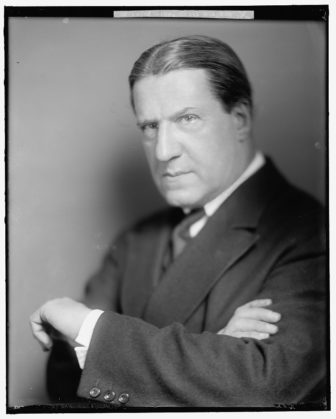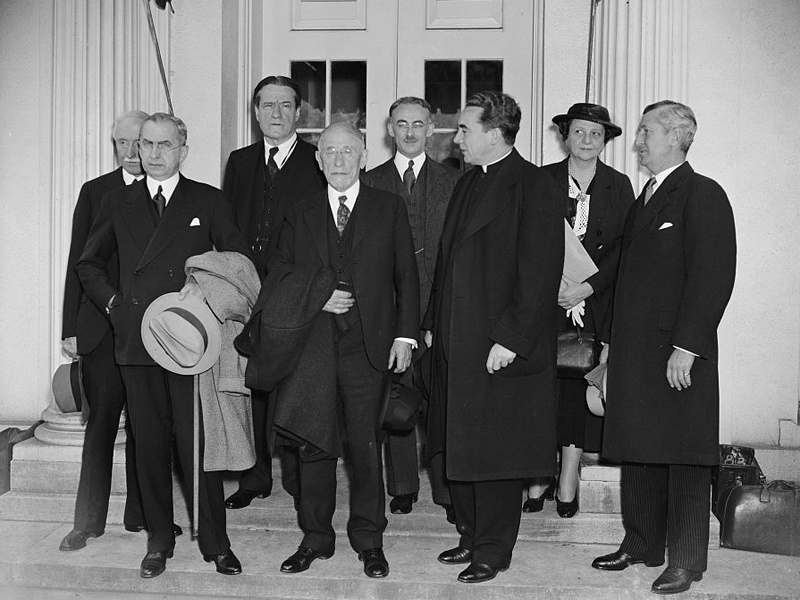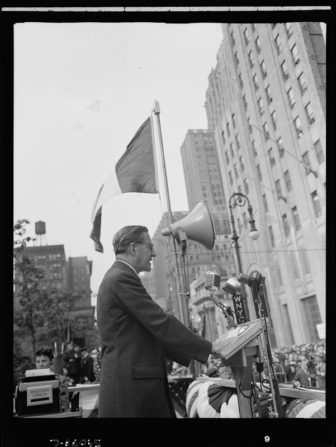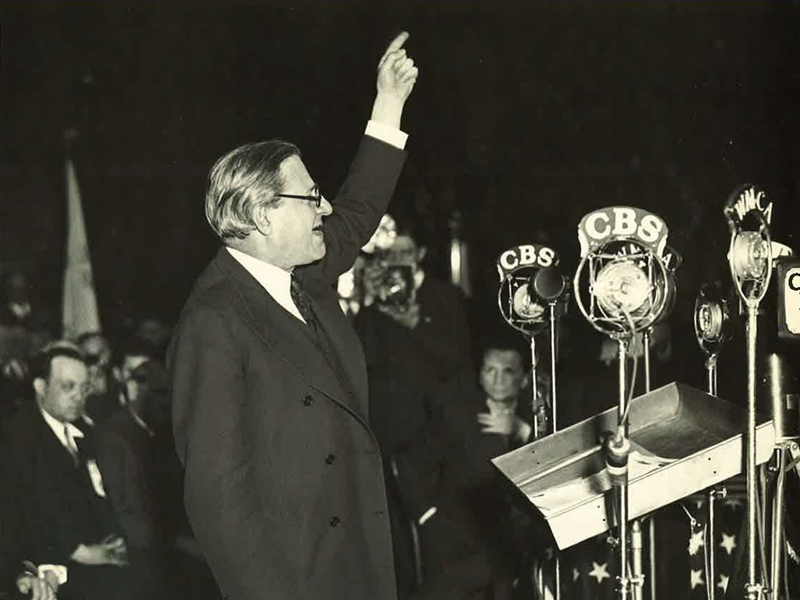
Rabbi Stephen S. Wise, the leader of the American Jewish community during the 1930s and 1940s, photographed by Harris & Ewing.
(RNS) Each time I publicly speak about President Franklin D. Roosevelt and Rabbi Stephen S. Wise, the leader of the American Jewish community during the 1930s and 1940s, there is a heated, sometimes angry debate among audience members that can be summed up in just four words: “Roosevelt and the Jews.”
FDR’s critics say the leader of the world’s most powerful country failed to use his extraordinary political capital to take lifesaving executive actions that would have countered, perhaps even prevented, the Nazis’ mass murder of more than 6 million Jews.
Roosevelt’s detractors claim that behind his jaunty demeanor, broad smile and omnipresent cigarette holder was a “closet anti-Semite” who failed to open wide the gates of entry for Jewish refugees who desperately sought to escape the Nazi killing machine in Europe.
And there is always this counterargument: FDR, after his election in 1932, faced the devastating Great Depression, strong anti-immigrant feeling and a virulent anti-Semitism fueled by Catholic priest Charles Coughlin’s obscene weekly radio broadcasts and the anti-Jewish speeches of aviator hero Charles Lindbergh.
This side further argues that beginning in 1941, Roosevelt, as commander in chief, successfully led a vast global military campaign that defeated not only Nazism, but fascism and Japanese militarism as well.

Experts on the refugee problem shown leaving the White House on April 13, 1938. After conferring with President Roosevelt, the group met with the President to go over preliminaries to an international conference to help political refugees from Germany and Austria. Left to right; Prof. Joseph P. Chamberlain, New York, Asst. Sec. of State Messersmith, Rabbi Stephen S. Wise, Henry Morgenthau, Rev. Samuel Cavert, New York, Rev. Michael J. Ready, Sec. of Labor Frances Perkins, and Lewis Kenedy, New York.
FDR supporters claim that during the late 1930s he carefully and skillfully prepared America for the war against totalitarianism through a series of adroit actions that included a peacetime military draft and a “lend-lease” program that militarily strengthened a beleaguered Great Britain.
There is little shared ground between these two polar positions regarding our nation’s 32nd president, who was elected four times and died in April 1945, a month before the defeat of Hitler’s “Thousand-Year Reich.”
At the epicenter of this intense debate is the controversial Wise-FDR relationship. The two leaders were New Yorkers, politically astute, superb orators, Ivy League graduates and charismatic larger-than-life figures with millions of devoted followers.
In their 13 face-to-face meetings, Wise constantly urged the president to save human lives by overriding the 1924 immigration law that severely restricted the number of Jewish refugees who could enter the U.S. In addition, Wise sought a full-throated presidential commitment to the establishment of a Jewish state in the biblical land of Israel.
The rabbi did not achieve either goal. At a 1943 White House dinner, FDR asked Wise’s daughter, who was a guest of the president, to convey his “affectionate regards” to her famous father.

New York, New York. June 6, 1944. Rabbi Stephen S. Wise at the D-day rally in Madison Square.
Wise was not impressed. He lamented: “If only he would do something for my people.”
But Wise, like FDR, is not immune to criticism.
In 2008, speaking as president of the Hebrew Union College-Jewish Institute of Religion, Rabbi David Ellenson said: “In the 1930s, it was Wise who led the rallies against Hitler, so why did he fail so horribly in the 1940s?” Ellenson’s answer was that Wise had an “absolute and complete love” for FDR, and that “helped blind him” to the need for more activism.
Ellenson was echoing an ancient Jewish teaching that warns: “Be careful with the leaders of government, for they befriend a person only for their own needs. They appear to be friends when it is beneficial to them, but they do not stand by a person at the time of his distress.”
Could another American Jewish leader have been more successful in persuading FDR to abandon his rigid position on rescuing Jews and gain the president’s unequivocal support for a Jewish state?
We will never know. That turbulent era and the issues Wise faced in his encounters with FDR are now history.

Rabbi Stephen Wise speaks to the media. (Date unknown) Photo courtesy of Stephen Wise Free Synagogue Archives
But even when we recognize the hostility and obstacles that Wise faced in those terrible years, I cannot understand his lack of courage and his inability to transcend, even sacrifice, his coveted solo leadership position for a larger goal: the need to save human lives.
Wise was unable or unwilling to accept the reality that no one leader is indispensable or has a monopoly on wisdom, courage and strength.
To whom much is given, much is expected. Because the Jewish people gave Wise their precious trust and love, they had the right to expect much more from him. Did they receive that kind of selfless leadership from Stephen Wise during their darkest moment in history? The answer is no.
(Rabbi A. James Rudin is the American Jewish Committee’s senior interreligious adviser and the author of “Pillar of Fire: A Biography of Rabbi Stephen S. Wise,” published by Texas Tech University Press. He can be reached at jamesrudin.com)

Did a prominent wartime rabbi fail European Jews?
(RNS) At the epicenter of this intense debate is the controversial relationship between FDR and Rabbi Stephen S. Wise.
Rabbi Stephen S. Wise, the leader of the American Jewish community during the 1930s and 1940s, photographed by Harris & Ewing.
(RNS) Each time I publicly speak about President Franklin D. Roosevelt and Rabbi Stephen S. Wise, the leader of the American Jewish community during the 1930s and 1940s, there is a heated, sometimes angry debate among audience members that can be summed up in just four words: “Roosevelt and the Jews.”
FDR’s critics say the leader of the world’s most powerful country failed to use his extraordinary political capital to take lifesaving executive actions that would have countered, perhaps even prevented, the Nazis’ mass murder of more than 6 million Jews.
Roosevelt’s detractors claim that behind his jaunty demeanor, broad smile and omnipresent cigarette holder was a “closet anti-Semite” who failed to open wide the gates of entry for Jewish refugees who desperately sought to escape the Nazi killing machine in Europe.
And there is always this counterargument: FDR, after his election in 1932, faced the devastating Great Depression, strong anti-immigrant feeling and a virulent anti-Semitism fueled by Catholic priest Charles Coughlin’s obscene weekly radio broadcasts and the anti-Jewish speeches of aviator hero Charles Lindbergh.
This side further argues that beginning in 1941, Roosevelt, as commander in chief, successfully led a vast global military campaign that defeated not only Nazism, but fascism and Japanese militarism as well.
Experts on the refugee problem shown leaving the White House on April 13, 1938. After conferring with President Roosevelt, the group met with the President to go over preliminaries to an international conference to help political refugees from Germany and Austria. Left to right; Prof. Joseph P. Chamberlain, New York, Asst. Sec. of State Messersmith, Rabbi Stephen S. Wise, Henry Morgenthau, Rev. Samuel Cavert, New York, Rev. Michael J. Ready, Sec. of Labor Frances Perkins, and Lewis Kenedy, New York.
FDR supporters claim that during the late 1930s he carefully and skillfully prepared America for the war against totalitarianism through a series of adroit actions that included a peacetime military draft and a “lend-lease” program that militarily strengthened a beleaguered Great Britain.
There is little shared ground between these two polar positions regarding our nation’s 32nd president, who was elected four times and died in April 1945, a month before the defeat of Hitler’s “Thousand-Year Reich.”
At the epicenter of this intense debate is the controversial Wise-FDR relationship. The two leaders were New Yorkers, politically astute, superb orators, Ivy League graduates and charismatic larger-than-life figures with millions of devoted followers.
In their 13 face-to-face meetings, Wise constantly urged the president to save human lives by overriding the 1924 immigration law that severely restricted the number of Jewish refugees who could enter the U.S. In addition, Wise sought a full-throated presidential commitment to the establishment of a Jewish state in the biblical land of Israel.
The rabbi did not achieve either goal. At a 1943 White House dinner, FDR asked Wise’s daughter, who was a guest of the president, to convey his “affectionate regards” to her famous father.
New York, New York. June 6, 1944. Rabbi Stephen S. Wise at the D-day rally in Madison Square.
Wise was not impressed. He lamented: “If only he would do something for my people.”
But Wise, like FDR, is not immune to criticism.
In 2008, speaking as president of the Hebrew Union College-Jewish Institute of Religion, Rabbi David Ellenson said: “In the 1930s, it was Wise who led the rallies against Hitler, so why did he fail so horribly in the 1940s?” Ellenson’s answer was that Wise had an “absolute and complete love” for FDR, and that “helped blind him” to the need for more activism.
Ellenson was echoing an ancient Jewish teaching that warns: “Be careful with the leaders of government, for they befriend a person only for their own needs. They appear to be friends when it is beneficial to them, but they do not stand by a person at the time of his distress.”
Could another American Jewish leader have been more successful in persuading FDR to abandon his rigid position on rescuing Jews and gain the president’s unequivocal support for a Jewish state?
We will never know. That turbulent era and the issues Wise faced in his encounters with FDR are now history.
Rabbi Stephen Wise speaks to the media. (Date unknown) Photo courtesy of Stephen Wise Free Synagogue Archives
But even when we recognize the hostility and obstacles that Wise faced in those terrible years, I cannot understand his lack of courage and his inability to transcend, even sacrifice, his coveted solo leadership position for a larger goal: the need to save human lives.
Wise was unable or unwilling to accept the reality that no one leader is indispensable or has a monopoly on wisdom, courage and strength.
To whom much is given, much is expected. Because the Jewish people gave Wise their precious trust and love, they had the right to expect much more from him. Did they receive that kind of selfless leadership from Stephen Wise during their darkest moment in history? The answer is no.
(Rabbi A. James Rudin is the American Jewish Committee’s senior interreligious adviser and the author of “Pillar of Fire: A Biography of Rabbi Stephen S. Wise,” published by Texas Tech University Press. He can be reached at jamesrudin.com)
Donate to Support Independent Journalism!